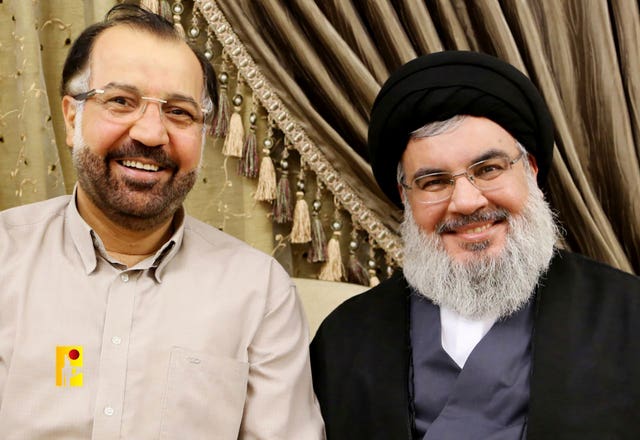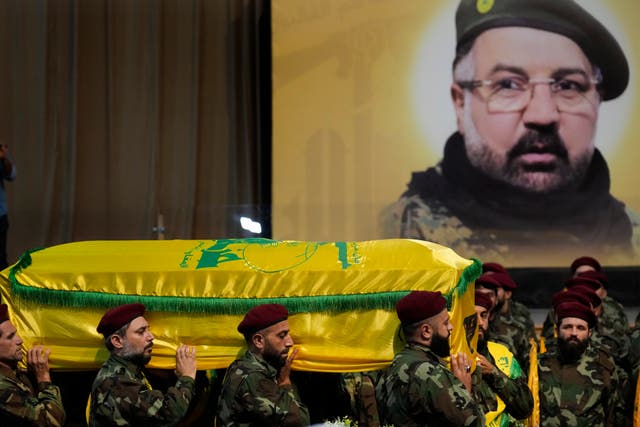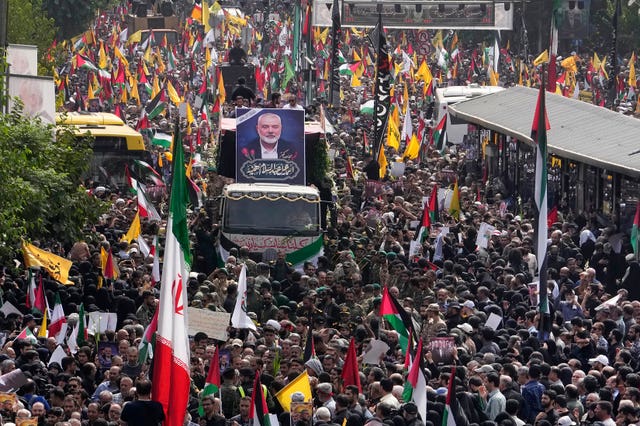Hezbollah leader says war with Israel has entered ‘new phase’
Hassan Nasrallah addressed mourners at the funeral of a commander from the group who was killed by an Israeli air strike this week.

Hezbollah’s leader has warned that the conflict with Israel has entered a “new phase”.
Hassan Nasrallah addressed mourners at the funeral of a commander from the group who was killed by an Israeli air strike this week in Beirut.
Meanwhile in Tehran, Iran’s supreme leader prayed over the body of Hamas’s political leader, who was killed in a presumed Israeli assassination.
The back-to-back killings have increased fears of an escalation into a wider war, leaving the region waiting to see how Iran and ally Hezbollah will respond. Iran has vowed retaliation against Israel for the strike that killed Hamas’s Ismail Haniyeh on Wednesday in the Iranian capital of Tehran.
Israel has not claimed responsibility for Mr Haniyeh’s assassination, but comments by Israeli military spokesman Rear Admiral Daniel Hagari stopped short of an outright denial.

Israel did confirm it carried out the strike on Tuesday in Beirut that killed Hezbollah commander Fouad Shukur, along with an Iranian military adviser and at least five civilians. Israel said Mr Shukur was behind a rocket attack days earlier that hit a football field in the Israeli-held Golan Heights, killing 12 children. Hezbollah denied being behind that strike, a denial that Mr Nasrallah reiterated.
In a speech via video link to mourners gathered with Mr Shukur’s coffin at an auditorium in a Beirut suburb, Mr Nasrallah said: “We … have entered a new phase that is different from the previous period.”
“Do they expect that Hajj Ismail Haniyeh will be killed in Iran and Iran will remain silent?” he said of the Israelis. Addressing Israelis who celebrated the two killings, he said: “Laugh a bit and you will cry a lot.”
But as he often does, Mr Nasrallah kept his comments vague, vowing a “very well-studied retaliation” without saying what form it would take. He said only that Israel “will have to wait for the anger of the region’s honourable people”.
“The enemy and the one who is behind the enemy” – an apparent reference to Israel’s chief ally, the United States – “will have to wait for our coming response,” he said.

Several times, strikes that appeared to cross red lines raised fears of an acceleration into full-fledged war, but outside diplomacy reined in the two sides. Hezbollah faces strong pressure not to draw Lebanon into a repeat of the militant group’s 2006 war with Israel, which wreaked heavy death and destruction in the country.
Israel and Iran risked plunging into war earlier this year when Israel hit Iran’s embassy in Damascus in April. Iran retaliated, and Israel countered in an unprecedented exchange of strikes on each other’s soil, but international efforts succeeded in containing that cycle before it spun out of control.
In Beirut’s southern suburbs, the biggest Shiite district in the capital, hundreds of black-clad mourners packed the auditorium, many of them holding Hezbollah flags or photos of Mr Shukur. An escort of red-capped fighters carried Mr Shukur’s coffin, also draped in a Hezbollah flag, down the aisle to the backing of a military band.
In his speech, Mr Nasrallah praised Mr Shukur as a veteran commander and denied that Hezbollah carried out the deadly strike on the football field in the mainly Druze town of Majdal Shams in the Golan.
“We have the courage to take responsibility for where we strike, even if it’s a mistake. If we made a mistake, we would admit and apologise,” he said, adding: “The enemy made itself the judge, jury, and executioner without any evidence.”
An unusual relative calm prevailed on Thursday on the Lebanon-Israel border. Hezbollah claimed no rocket launches into Israel during the day. The Lebanese state news agency said a strike hit the house of a Syrian family in a southern Lebanese town, killing at least four people and wounding several others. Afterwards, Hezbollah announced it had launched a barrage of rockets into Israel in retaliation.
Mr Nasrallah said Hezbollah’s fighters would return to regular military operations on Friday, ending the period of mourning for Mr Shukur, but that the renewed strikes would be unrelated to the retaliation for his killing.

Mr Haniyeh’s remains are to be transferred to Qatar for burial on Friday.





